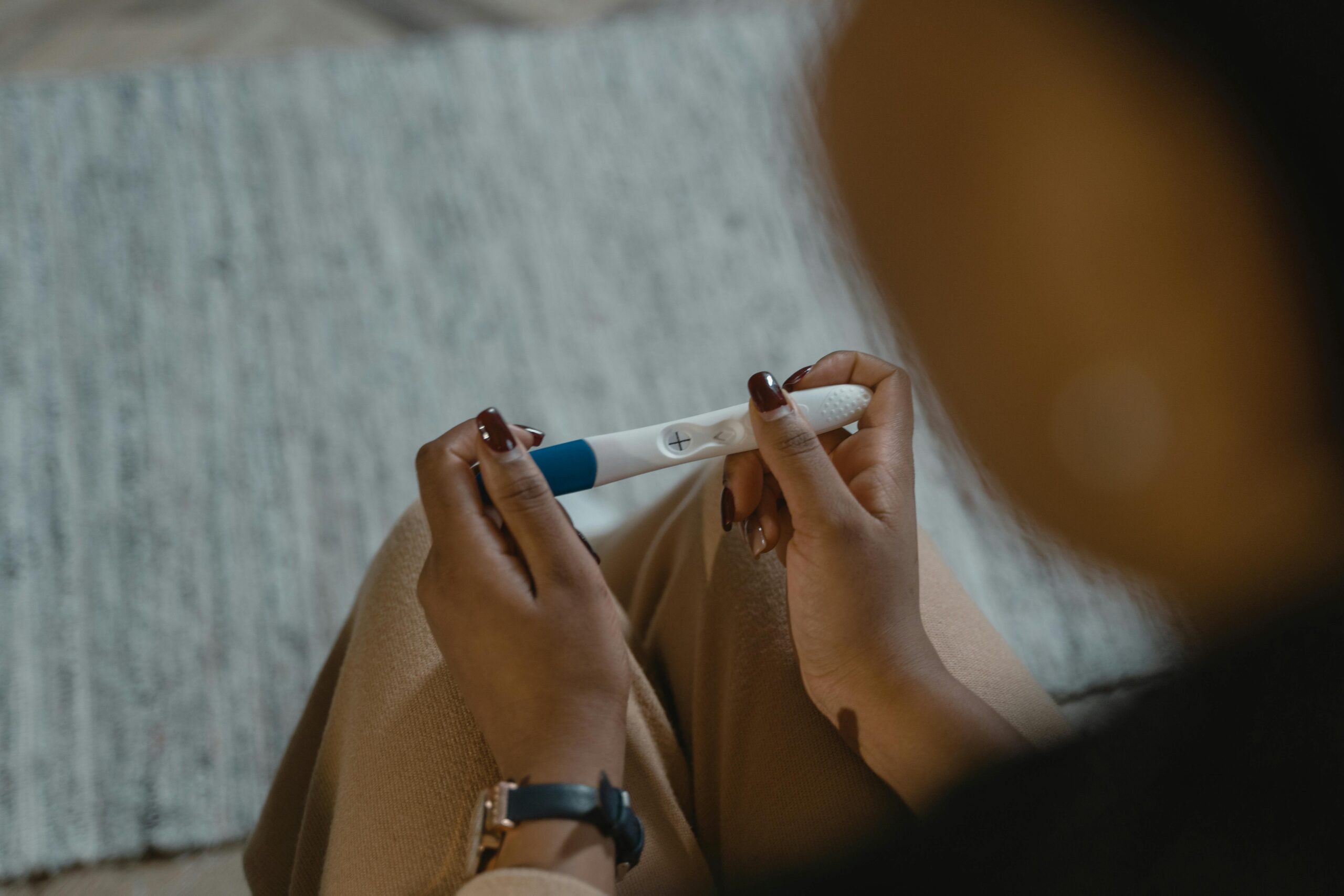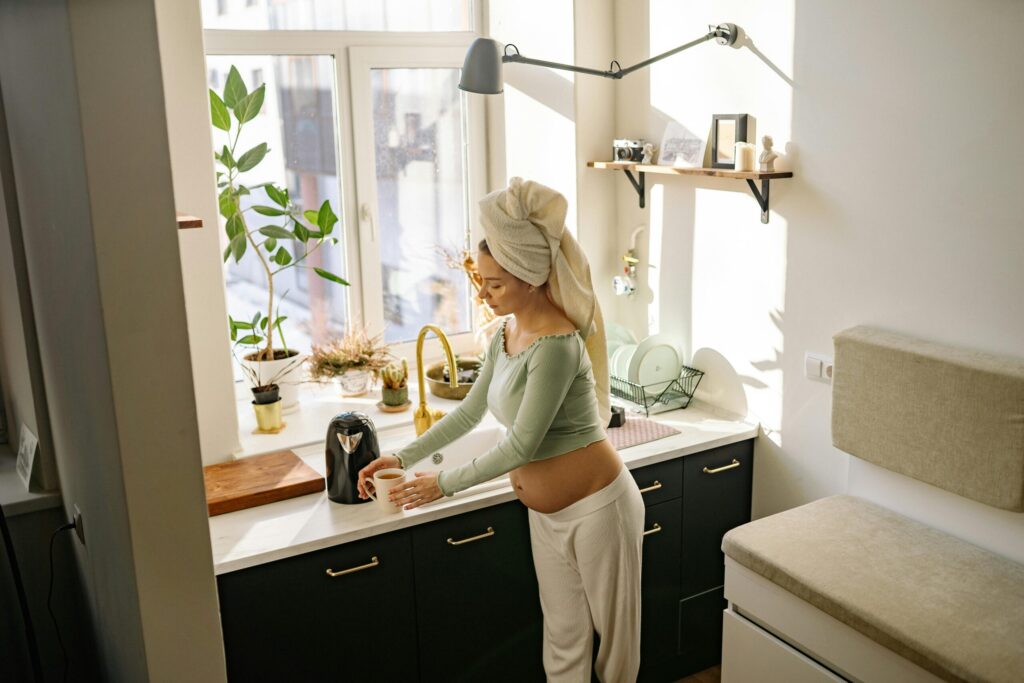Are you feeling slightly “off” but can’t quite put your finger on why? Perhaps your breasts feel unusually sensitive, or you’re suddenly repulsed by your favorite coffee. As both a mother of five and a midwife with over two decades of experience, I’ve learned that your body often knows you’re pregnant before your mind catches up. These early signs are like whispers from your changing body – subtle but significant.
I’ll never forget when I was pregnant with my third child. I found myself standing in the kitchen at 2 AM, eating pickles with honey – a combination I would normally find revolting. That’s when I knew, even before taking a test, that another little one was on the way.
In this comprehensive guide, I’ll walk you through the early pregnancy signs I’ve both experienced personally and observed in hundreds of women throughout my midwifery career.
The Science Behind Early Pregnancy Symptoms
Before diving into specific symptoms, let’s understand what causes them. The moment conception occurs and the fertilized egg implants in your uterine lining, your body begins producing human chorionic gonadotropin (hCG) – the hormone detected by pregnancy tests. Additionally, progesterone and estrogen levels surge, triggering a cascade of changes throughout your body.
According to the American Pregnancy Association, about 29% of women report a missed period as their first pregnancy sign, while 25% notice breast changes, and 17% experience nausea. But these are just the beginning.
Timeline: When Symptoms Typically Appear
Your body often knows you’re pregnant before your mind catches up, sometimes within days of conception. Here’s a general timeline of when you might notice various symptoms:
- Days 7-10 after conception: Implantation bleeding and mild cramping
- Days 10-14: Breast tenderness, fatigue, heightened sense of smell
- Days 14-28: Nausea, food aversions, frequent urination
- After Day 28: Missed period, continued and intensifying early symptoms
During my fifth pregnancy, I noticed breast tenderness just 8 days after conception – well before I could take a reliable pregnancy test. Having tracked my symptoms through multiple pregnancies, I’d learned to recognize my body’s particular pattern of early pregnancy signs.
The “Classic” Early Pregnancy Signs
While every woman’s experience is unique, certain symptoms are commonly reported in early pregnancy.
Missed or Strange Period
A missed period is the most obvious sign of pregnancy, but your body often knows you’re pregnant before your mind catches up to this clear signal. Some women experience light spotting around the time their period would normally occur, which can be confusing.
With my second pregnancy, what I thought was a very light period was actually implantation bleeding. It was much lighter than my normal flow and lasted only about a day and a half, compared to my usual four days.
What to look for:
- Complete absence of period
- Significantly lighter or shorter bleeding than usual
- Spotting that doesn’t develop into a full period
- Different color (often lighter or browner) than your typical period
Breast Changes: More Than Just Tenderness
Breast changes can begin remarkably early in pregnancy. It’s not just about tenderness – though that’s certainly common.
What to look for:
- Sensitivity and soreness (sometimes to the point where wearing a bra is uncomfortable)
- Heaviness or fullness
- Darkening areolas
- More pronounced veins
- Tingling sensations
During my midwifery practice, I’ve had numerous women tell me they knew they were pregnant because their breasts suddenly didn’t fit in their bras properly. One memorable client came in for confirmation after noticing her areolas had darkened – she was only about 3 weeks pregnant but had recognized this sign from her previous pregnancy.
Fatigue: That Distinctive Pregnancy Exhaustion
Pregnancy fatigue is not your ordinary tiredness. It’s a bone-deep exhaustion that no amount of coffee can touch (not that you should be having much once you suspect pregnancy).
With my fourth pregnancy, I found myself falling asleep putting my toddler down for his nap – something that had never happened before. This profound fatigue was my body’s way of telling me to slow down and conserve energy for the enormous task of creating a new human.
What it feels like:
- Exhaustion that strikes suddenly
- Needing naps when you’ve never been a napper
- Falling asleep earlier than usual
- Difficulty getting out of bed in the morning
- A heavy feeling, like moving through molasses
The Lesser-Known Early Pregnancy Signs
Your body often knows you’re pregnant before your mind catches up, especially when it comes to these subtler symptoms that many don’t immediately associate with pregnancy.
Heightened Sense of Smell
This symptom is often described in pregnancy literature but until you experience it, it’s hard to comprehend just how dramatic it can be.
During my first pregnancy, I could suddenly smell the garbage from outside our apartment building before even entering. My husband thought I was exaggerating until I correctly identified what our neighbors three doors down were cooking for dinner just by walking past their apartment.
What it feels like:
- Odors seem more intense
- Smelling things others can’t detect
- Being bothered by scents that never bothered you before
- Often accompanied by sudden aversions to previously enjoyed smells
Food Aversions and Cravings
While most people associate pregnancy with unusual cravings, food aversions often appear first and can be even more pronounced.
With my third pregnancy, I suddenly couldn’t stand the taste of chicken – a protein I normally ate several times a week. Meanwhile, I developed an intense craving for citrus fruits and could easily eat five oranges in one sitting.
According to a study published in Frontiers in Psychology, food aversions and cravings affect between 50-90% of pregnant women, with aversions most commonly to meat, eggs, dairy products, caffeine, and pungent-smelling foods.
What to notice:
- Sudden disgust toward favorite foods
- Cravings for foods you don’t typically eat
- Specific taste preferences (sour, salty, sweet)
- Changes in appetite (either increased or decreased)
Emotional Sensitivity

Hormone fluctuations in early pregnancy can make you more emotionally reactive than usual.
I remember crying over a paper towel commercial during my second pregnancy – something my husband still teases me about. Those early pregnancy hormones had me convinced the story of a family cleaning up spills together was the most moving narrative ever told.
What it feels like:
- Crying at things that normally wouldn’t affect you
- Feeling overwhelmed more easily
- Mood swings
- Heightened anxiety or worry
Changes in Bathroom Habits
Your body often knows you’re pregnant before your mind catches up, particularly when it comes to digestive and urinary changes.
Frequent Urination
With my fifth pregnancy, I noticed I was getting up to use the bathroom twice each night – unusual for me – before I’d even missed my period.
This early pregnancy symptom occurs because:
- Your kidneys are processing extra fluid
- Your blood volume begins increasing very early in pregnancy
- hCG may increase blood flow to the pelvic area
Constipation
The surge in progesterone slows your digestive system, which can lead to constipation well before other obvious pregnancy signs appear.
Many women I’ve cared for as a midwife report constipation as one of their earliest pregnancy symptoms, often before they’ve even considered that they might be pregnant.
Unusual But Real Early Pregnancy Signs
After five pregnancies and working with thousands of women, I’ve encountered some less commonly discussed but very real early pregnancy indicators.
Metallic Taste
About 60% of pregnant women experience dysgeusia – a change in taste perception that often manifests as a metallic taste.
With my second pregnancy, I kept checking my dental fillings because I was convinced something was wrong with them. Everything tasted like I was sucking on pennies. My dentist found nothing wrong, and two days later, my pregnancy test came back positive.
Congestion and Nosebleeds
Increased blood volume and hormonal changes can cause the mucous membranes in your nose to swell, leading to congestion or nosebleeds.
This symptom is so common that there’s even a name for it: pregnancy rhinitis. Many women mistake it for allergies or a cold, especially since it can start within days of conception.
Temperature Changes
If you track your basal body temperature for fertility purposes, you may notice that an elevated temperature persists beyond when you’d expect it to drop before your period.
This continued elevation occurs because progesterone keeps your body temperature slightly higher throughout pregnancy.
When to Take a Pregnancy Test
With all these potential signs, you may wonder when to confirm with a test. Home pregnancy tests detect hCG in your urine, which increases rapidly in early pregnancy but may not reach detectable levels until close to when your period is due.
Best practices for testing:
- Wait until the first day of your missed period for most reliable results
- Use first morning urine (most concentrated)
- Follow package directions precisely
- If negative but symptoms persist, wait 3-7 days and test again
During my years as a midwife, I’ve seen countless women get false negatives by testing too early. Remember that your body often knows you’re pregnant before your mind catches up – and sometimes before a test can confirm it.
When to See a Healthcare Provider
If you’ve had a positive pregnancy test, you should schedule a prenatal appointment. Most providers will see you between 8-10 weeks from your last menstrual period.
However, contact a healthcare provider sooner if you experience:
- Severe pain or cramping
- Heavy bleeding
- Dizziness or fainting
- Severe nausea and vomiting preventing fluid intake
- History of ectopic pregnancy or current risk factors
False Alarms: When It’s Not Pregnancy
It’s worth noting that many early pregnancy symptoms can overlap with:
- Premenstrual syndrome
- Perimenopause
- Thyroid disorders
- Stress
- Illness
- Medication side effects
During my midwifery career, I’ve supported many women through “symptom confusion” – where they were convinced they were pregnant based on symptoms alone. This is why confirmation with a test and eventual healthcare provider visit is essential.
The Bottom Line: Trust Your Body
After five pregnancies and two decades helping women navigate early pregnancy, my most important advice is this: trust your instincts. Your body often knows you’re pregnant before your mind catches up, sometimes even before tests can confirm it.
With my fifth baby, I knew I was pregnant within days of conception. The subtle constellation of changes was so familiar to me by then that I didn’t need a test to confirm what my body was already telling me (though I did take one eventually).
Every pregnancy is unique, just as every woman is unique. You might experience all the symptoms described here, just a few, or even some I haven’t mentioned. What matters is paying attention to your body’s signals and seeking appropriate care when you suspect you might be embarking on the remarkable journey of pregnancy.
Remember, those tender breasts and peculiar cravings aren’t just odd bodily quirks – they’re often the first pages of your pregnancy story, a story that I’ve been privileged to witness thousands of times, both personally and professionally.



